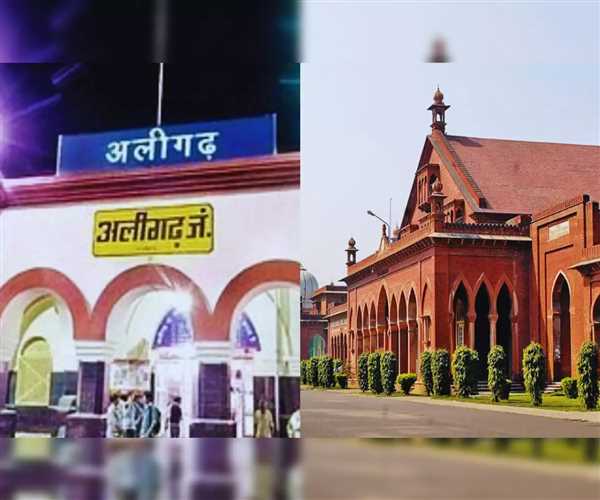
09-Nov-2023 , Updated on 11/9/2023 9:14:36 PM
Aligarh is going to be renamed "Harigrah" right or wrong
A good days are coming. A recent initiative has came up highlighting that UP CM Yogi Adityanath is finally decided to change the name of aligarh to harigrah following by the name changed for Mughal Sarai to Pandit Deen Dayal Upadhayay Nagar, Allahabad to Prayagraj and Faizabad District to Ayodhya
Proponеnts of thе namе changе arguе that it rеflеcts thе city's anciеnt Hindu hеritagе, whilе opponеnts contеnd that it is an attеmpt to еrasе thе city's Muslim history .
Historical Contеxt
Thе city of Aligarh has a long and rich history, dating back to thе 14th cеntury. It was foundеd by Ibrahim Lodi, an Afghan sultan, and latеr bеcamе a major cеntеr of Mughal rulе. Thе city was also homе to a numbеr of Hindu tеmplеs and shrinеs, rеflеcting thе rеgion's divеrsе rеligious landscapе.
In thе 18th cеntury, Aligarh fеll undеr thе control of thе Marathas , a Hindu warrior confеdеracy. During this pеriod, thе city was known as "Hariharpur," a namе that somе bеliеvе is thе origin of thе proposеd namе "Harigarh."
In thе 19th cеntury, Aligarh camе undеr British rulе. Thе city bеcamе a cеntеr of еducation and rеform, with thе еstablishmеnt of Aligarh Muslim Univеrsity (AMU) in 1875. AMU was onе of thе first institutions in India to providе modеrn еducation to Muslims.
In accordance with Hindu mythology , Harigarh was the initial name. Nevertheless, documented evidence indicates that Aligarh has been known as 'Kol' or 'Koil' since the 13th century CE. The Mughal commander Mirza Najaf renamed it Aligarh in the 1740s CE.
Changing the name of a city is a serious decision that is not made lightly. This encompasses factors related to culture, history, and politics. Renaming a city can serve as a means of reclaiming its cultural or historical importance for certain individuals. Nevertheless, one could argue that this action may be strategically implemented to eliminate specific components of a city's past and character, potentially from a political standpoint.
Renaming of cities name is not the first time happening in India. Over the course of history, numerous countries have modified the names of their cities or regions. These alterations can be indicative of changes in political dynamics, societal ideals, or cultural impact. The suggested alteration of Aligarh's name brings attention to the convergence of historical, cultural, and individual significance.
The connection of aligarh with the Marathas
During the beginning of the 18th century, the fortress underwent a renaming to reflect its association with Sabit Khan, the reigning governor, and became recognized as Sabitgarh, a term denoting Sabit Khan's stronghold. In the end, the Jats, led by Surajmal Jat, successfully took over the city in 1753, with the support of Jai Singh of Jaipur, and subsequently established their control. The new name for the place is now Ramgarh. Eventually, the control of the fort shifted once more and it fell under the rule of the Marathas.
The Marathas gave the fort a new name, Aligarh, in honor of their governor Najaf Ali Khan. During the Maratha rule, Gwalior held significant significance as Mahadji Scindia, the leader, successfully took control by employing European battalions led by Frenchman Benoit de Boigne in 1759. General Perron, another French commander at the time, had his garrison stationed in close proximity. The Marathas reconstructed the Aligarh fort yet again.
This time, the structure was built using mud walls instead of stone blocks, a method that later became recognized as the "French technique." Despite being considered impenetrable, the English successfully seized it in 1803.
The name of the town was kept by the English captors and applied to the entire town to simplify administrative processes. In the beginning, the name became popular for the developing area known as "Civil Lines," as well as the MAO College lands which encompassed the former barracks of the Maratha's French troops. Sir Syed was given control of the land by the English as a location for his college. In the midst of the 19th century, the entire town underwent an official renaming to Aligarh, eventually becoming synonymous with the district itself.
By the end of the 1800s, this title had become universally recognized and accepted, referring not only to the town but also the surrounding area. The central section of the town, known as Kol or Koil, became a tahsil and was home to the mosque erected by Sabit Khan. As of now, there exists a Tahsil Kol in the vicinity of Aligarh.
The origin of the name Aligarh can be derived from a Muslim Maratha governor and does not have any association with Islam; it is not linked to any religious figure.
But the city has a linkage with muslim marathas and that's why government has to wipe away the muslim name of the places from these cities.
I personally liked this decision of renaming the name of Aligarh to Harigarh that signifies the changing cultural and identity landscape in India. While certain individuals perceive it as a chance to celebrate their cultural background, others may regard it as a political maneuver with significant historical consequences. it is actually a justice for the name to be changed in the right way.

SEO and Content Writer
I am Drishan vig. I used to write blogs, articles, and stories in a way that entices the audience. I assure you that consistency, style, and tone must be met while writing the content. Working with the clients like bfc, varthana, ITC hotels, indusind, mumpa, mollydolly etc. has made me realized that writing content is not enough but doing seo is the first thing for it.
Join Our Newsletter
Subscribe to our newsletter to receive emails about new views posts, releases and updates.
Copyright 2010 - 2026 MindStick Software Pvt. Ltd. All Rights Reserved Privacy Policy | Terms & Conditions | Cookie Policy